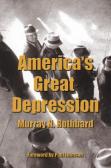Literature: A-Z Index
A
Material Name


|
Cover Image


|
Material Author


|
Summary


|
|
|---|---|---|---|---|
| America's Great Depression |

|
Murray N. Rothbard | This book applies Austrian business cycle theory to understanding the onset of the 1929 Great Depression. Rothbard first summarizes the Austrian theory and offers a criticism of competing theories, including the views of Keynes. | View |
| Anatomy of the State | Murray N Rothbard | This gives a succinct account of Rothbard’s view of the state. Following Franz Oppenheimer and Albert Jay Nock, Rothbard regards the state as a predatory entity. It does not produce anything but rather steals resources from those engaged in production. In applying this view to American history, Rothbard makes use of the work of John C. Calhoun. | View | |
| Anything That's Peaceful: The Case for the Free Market | Leonard E. Read | Leonard Read was a great spokesman for liberty, and an excellent teacher in the second half of the 20th century. Everyone agrees that this is his most inspired collection. It includes the essay later called "I, Pencil," which is a masterful description of the workings of the division of labor. His constant theme was that it takes human cooperation across the globe under conditions of liberty to produce even the most seemingly simple object. We dare not take it for granted. | View |
F
Material Name


|
Cover Image


|
Material Author


|
Summary


|
|
|---|---|---|---|---|
| For a New Liberty: The Libertarian Manifesto | Murray N Rothbard | In For a New Liberty: The Libertarian Manifesto, Rothbard proposes a once-and-for-all escape from the two major political parties, the ideologies they embrace, and their central plans for using state power against people. Libertarianism is Rothbard's radical alternative that says state power is unworkable and immoral and ought to be curbed and finally abolished. | View | |
| For a New Liberty: The Libertarian Manifesto | Murray N Rothbard | In For a New Liberty: The Libertarian Manifesto, Rothbard proposes a once-and-for-all escape from the two major political parties, the ideologies they embrace, and their central plans for using state power against people. Libertarianism is Rothbard's radical alternative that says state power is unworkable and immoral and ought to be curbed and finally abolished. | View |
H
Material Name


|
Cover Image


|
Material Author


|
Summary


|
|
|---|---|---|---|---|
| Human Action | Ludwig von Mises | The masterpiece first appeared in German in 1940 and then disappeared, only to reappear in English in 1949. It was a sensation, the largest and most scientific defense of human freedom ever published. | View |
L
Material Name


|
Cover Image


|
Material Author


|
Summary


|
|
|---|---|---|---|---|
| Liberty and Property | Ludwig von Mises | In here, Mises describes the revolutionary meaning of capitalism in human history, and how it was responsible for the most spectacular increases in the standard of living of the common man ever. It was mass production that lead people to live longer, healthier, and happier lives. | View |
M
Material Name


|
Cover Image


|
Material Author


|
Summary


|
|
|---|---|---|---|---|
| Man, Economy, and State, with Power and Market | Murray Rothbard | View |
O
Material Name


|
Cover Image


|
Material Author


|
Summary


|
|
|---|---|---|---|---|
| Omnipotent Government: The Rise of the Total State and Total War | Ludwig von Mises | View |
S
Material Name


|
Cover Image


|
Material Author


|
Summary


|
|
|---|---|---|---|---|
| Socialism: An Economic and Sociological Analysis | Ludwig von Mises | View | ||
| Study Guide to The Theory of Money and Credit | Robert Murphy | Consider the timing of this wonderful study guide to the best book ever written on money and credit. The book itself was written 100 years ago. The world economy is in the throes of another financial and debt crisis. Keynesianism has completely failed. Fiat money has too. Above it all stands Mises's masterwork, laying out the whole correct theory of money: it should be sound, solid, and market controlled. | View |
T
Material Name


|
Cover Image


|
Material Author


|
Summary


|
|
|---|---|---|---|---|
| The Anti-Capitalistic Mentality | Ludwig von Mises | View | ||
| The Economics and Ethics of Private Property | Hans-Hermann Hoppe | Hans-Hermann Hoppe has devoted his life's work to the economics and ethics of private property. This book collects some of Hoppe's most important essays on this topic. | View | |
| The Myth of National Defense: Essays on the Theory and History of Security Production | Hans-Hermann Hoppe | The libertarian idea of society without a state appeals to many people, but, however enticing the idea, it is often dismissed as utopian. How could an anarchist society defend itself against large, centralized states? Defense, it has been alleged, cannot be adequately supplied by the free market. It is what economists term a “public good.” | View | |
| The Theory of Money and Credit | Ludwig von Mises | View |

